The Impact of Motivation on Well-being and Academic Performance
VerifiedAdded on 2019/09/19
|11
|3362
|697
Essay
AI Summary
This essay delves into the critical role of motivation in higher education, examining its influence on students' study strategies, academic achievement, and overall well-being. It explores the motivational framework proposed by Deci and Ryan, differentiating between intrinsic, extrinsic, and amotivated behaviors, and the various forms of extrinsic motivation. The study investigates the relationships between these motivational orientations and factors such as adjustment to university, stress levels, and psychological health, while controlling for academic aptitude. The findings highlight the significant impact of amotivation on negative outcomes, such as poor psychosocial adjustment, high stress levels, and reduced well-being. The essay also discusses the implications of these findings, suggesting that the university environment and its emphasis on autonomy support can significantly impact student motivation and its associated outcomes. The study found that the general climate in the university may have acted to increase amotivational behaviors that, in turn, were associated with poor outcomes. The study did not find any relationship between motivational orientations and academic performance, but proposes that motivational orientations may have indirect effects on students’ performance via levels of adjustment or perceived stress while studying.
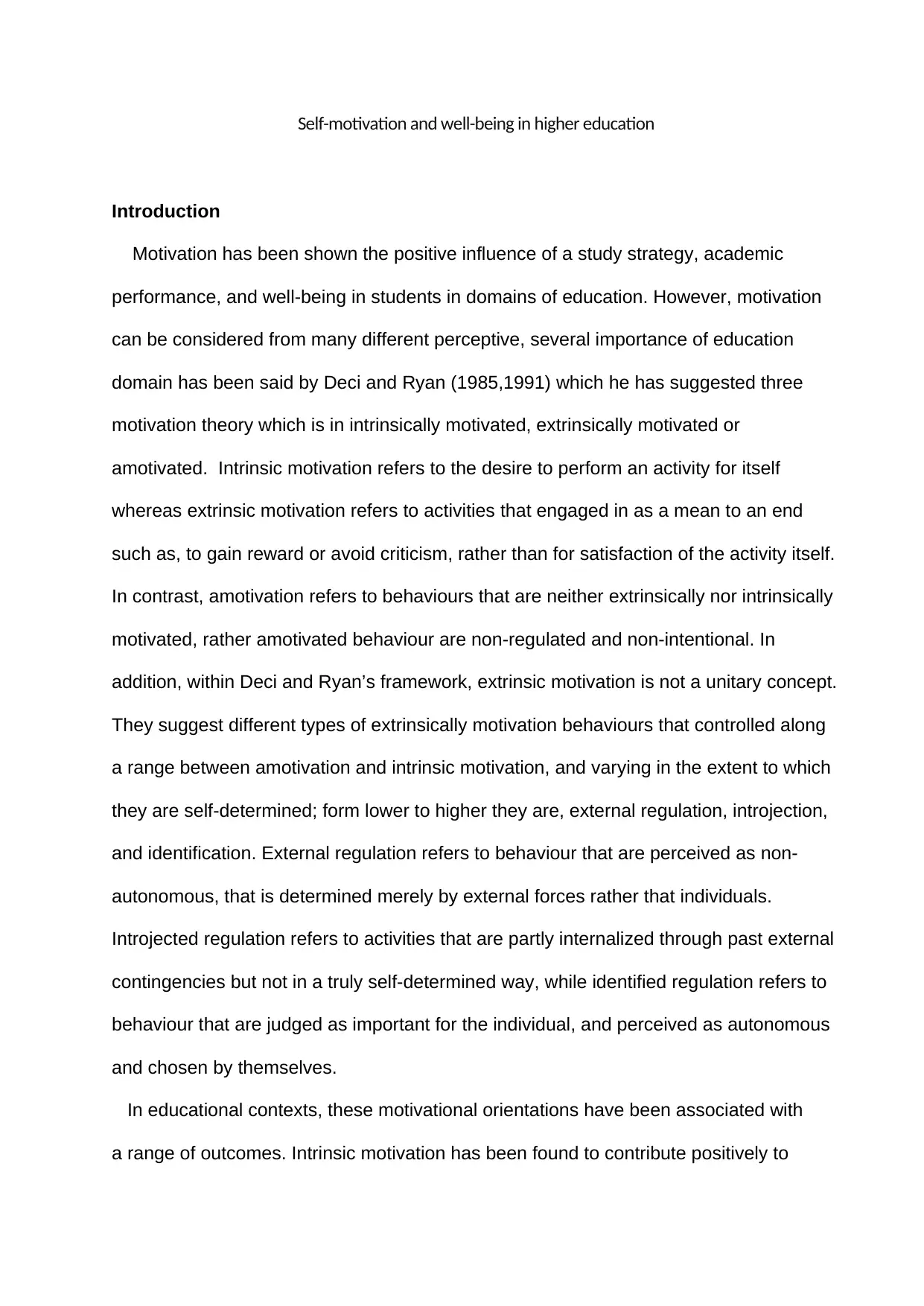
Self-motivation and well-being in higher education
Introduction
Motivation has been shown the positive influence of a study strategy, academic
performance, and well-being in students in domains of education. However, motivation
can be considered from many different perceptive, several importance of education
domain has been said by Deci and Ryan (1985,1991) which he has suggested three
motivation theory which is in intrinsically motivated, extrinsically motivated or
amotivated. Intrinsic motivation refers to the desire to perform an activity for itself
whereas extrinsic motivation refers to activities that engaged in as a mean to an end
such as, to gain reward or avoid criticism, rather than for satisfaction of the activity itself.
In contrast, amotivation refers to behaviours that are neither extrinsically nor intrinsically
motivated, rather amotivated behaviour are non-regulated and non-intentional. In
addition, within Deci and Ryan’s framework, extrinsic motivation is not a unitary concept.
They suggest different types of extrinsically motivation behaviours that controlled along
a range between amotivation and intrinsic motivation, and varying in the extent to which
they are self-determined; form lower to higher they are, external regulation, introjection,
and identification. External regulation refers to behaviour that are perceived as non-
autonomous, that is determined merely by external forces rather that individuals.
Introjected regulation refers to activities that are partly internalized through past external
contingencies but not in a truly self-determined way, while identified regulation refers to
behaviour that are judged as important for the individual, and perceived as autonomous
and chosen by themselves.
In educational contexts, these motivational orientations have been associated with
a range of outcomes. Intrinsic motivation has been found to contribute positively to
Introduction
Motivation has been shown the positive influence of a study strategy, academic
performance, and well-being in students in domains of education. However, motivation
can be considered from many different perceptive, several importance of education
domain has been said by Deci and Ryan (1985,1991) which he has suggested three
motivation theory which is in intrinsically motivated, extrinsically motivated or
amotivated. Intrinsic motivation refers to the desire to perform an activity for itself
whereas extrinsic motivation refers to activities that engaged in as a mean to an end
such as, to gain reward or avoid criticism, rather than for satisfaction of the activity itself.
In contrast, amotivation refers to behaviours that are neither extrinsically nor intrinsically
motivated, rather amotivated behaviour are non-regulated and non-intentional. In
addition, within Deci and Ryan’s framework, extrinsic motivation is not a unitary concept.
They suggest different types of extrinsically motivation behaviours that controlled along
a range between amotivation and intrinsic motivation, and varying in the extent to which
they are self-determined; form lower to higher they are, external regulation, introjection,
and identification. External regulation refers to behaviour that are perceived as non-
autonomous, that is determined merely by external forces rather that individuals.
Introjected regulation refers to activities that are partly internalized through past external
contingencies but not in a truly self-determined way, while identified regulation refers to
behaviour that are judged as important for the individual, and perceived as autonomous
and chosen by themselves.
In educational contexts, these motivational orientations have been associated with
a range of outcomes. Intrinsic motivation has been found to contribute positively to
Paraphrase This Document
Need a fresh take? Get an instant paraphrase of this document with our AI Paraphraser
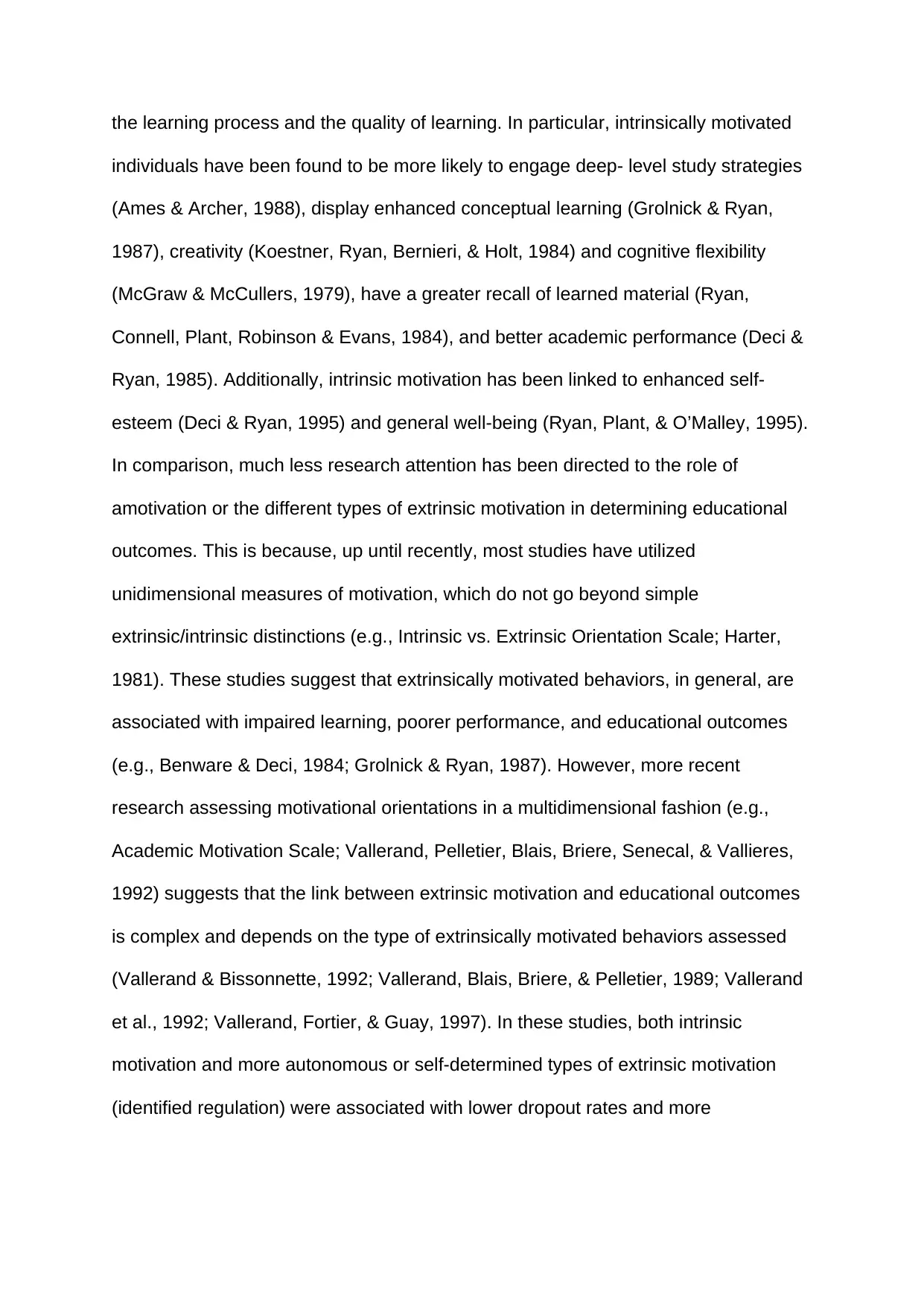
the learning process and the quality of learning. In particular, intrinsically motivated
individuals have been found to be more likely to engage deep- level study strategies
(Ames & Archer, 1988), display enhanced conceptual learning (Grolnick & Ryan,
1987), creativity (Koestner, Ryan, Bernieri, & Holt, 1984) and cognitive flexibility
(McGraw & McCullers, 1979), have a greater recall of learned material (Ryan,
Connell, Plant, Robinson & Evans, 1984), and better academic performance (Deci &
Ryan, 1985). Additionally, intrinsic motivation has been linked to enhanced self-
esteem (Deci & Ryan, 1995) and general well-being (Ryan, Plant, & O’Malley, 1995).
In comparison, much less research attention has been directed to the role of
amotivation or the different types of extrinsic motivation in determining educational
outcomes. This is because, up until recently, most studies have utilized
unidimensional measures of motivation, which do not go beyond simple
extrinsic/intrinsic distinctions (e.g., Intrinsic vs. Extrinsic Orientation Scale; Harter,
1981). These studies suggest that extrinsically motivated behaviors, in general, are
associated with impaired learning, poorer performance, and educational outcomes
(e.g., Benware & Deci, 1984; Grolnick & Ryan, 1987). However, more recent
research assessing motivational orientations in a multidimensional fashion (e.g.,
Academic Motivation Scale; Vallerand, Pelletier, Blais, Briere, Senecal, & Vallieres,
1992) suggests that the link between extrinsic motivation and educational outcomes
is complex and depends on the type of extrinsically motivated behaviors assessed
(Vallerand & Bissonnette, 1992; Vallerand, Blais, Briere, & Pelletier, 1989; Vallerand
et al., 1992; Vallerand, Fortier, & Guay, 1997). In these studies, both intrinsic
motivation and more autonomous or self-determined types of extrinsic motivation
(identified regulation) were associated with lower dropout rates and more
individuals have been found to be more likely to engage deep- level study strategies
(Ames & Archer, 1988), display enhanced conceptual learning (Grolnick & Ryan,
1987), creativity (Koestner, Ryan, Bernieri, & Holt, 1984) and cognitive flexibility
(McGraw & McCullers, 1979), have a greater recall of learned material (Ryan,
Connell, Plant, Robinson & Evans, 1984), and better academic performance (Deci &
Ryan, 1985). Additionally, intrinsic motivation has been linked to enhanced self-
esteem (Deci & Ryan, 1995) and general well-being (Ryan, Plant, & O’Malley, 1995).
In comparison, much less research attention has been directed to the role of
amotivation or the different types of extrinsic motivation in determining educational
outcomes. This is because, up until recently, most studies have utilized
unidimensional measures of motivation, which do not go beyond simple
extrinsic/intrinsic distinctions (e.g., Intrinsic vs. Extrinsic Orientation Scale; Harter,
1981). These studies suggest that extrinsically motivated behaviors, in general, are
associated with impaired learning, poorer performance, and educational outcomes
(e.g., Benware & Deci, 1984; Grolnick & Ryan, 1987). However, more recent
research assessing motivational orientations in a multidimensional fashion (e.g.,
Academic Motivation Scale; Vallerand, Pelletier, Blais, Briere, Senecal, & Vallieres,
1992) suggests that the link between extrinsic motivation and educational outcomes
is complex and depends on the type of extrinsically motivated behaviors assessed
(Vallerand & Bissonnette, 1992; Vallerand, Blais, Briere, & Pelletier, 1989; Vallerand
et al., 1992; Vallerand, Fortier, & Guay, 1997). In these studies, both intrinsic
motivation and more autonomous or self-determined types of extrinsic motivation
(identified regulation) were associated with lower dropout rates and more
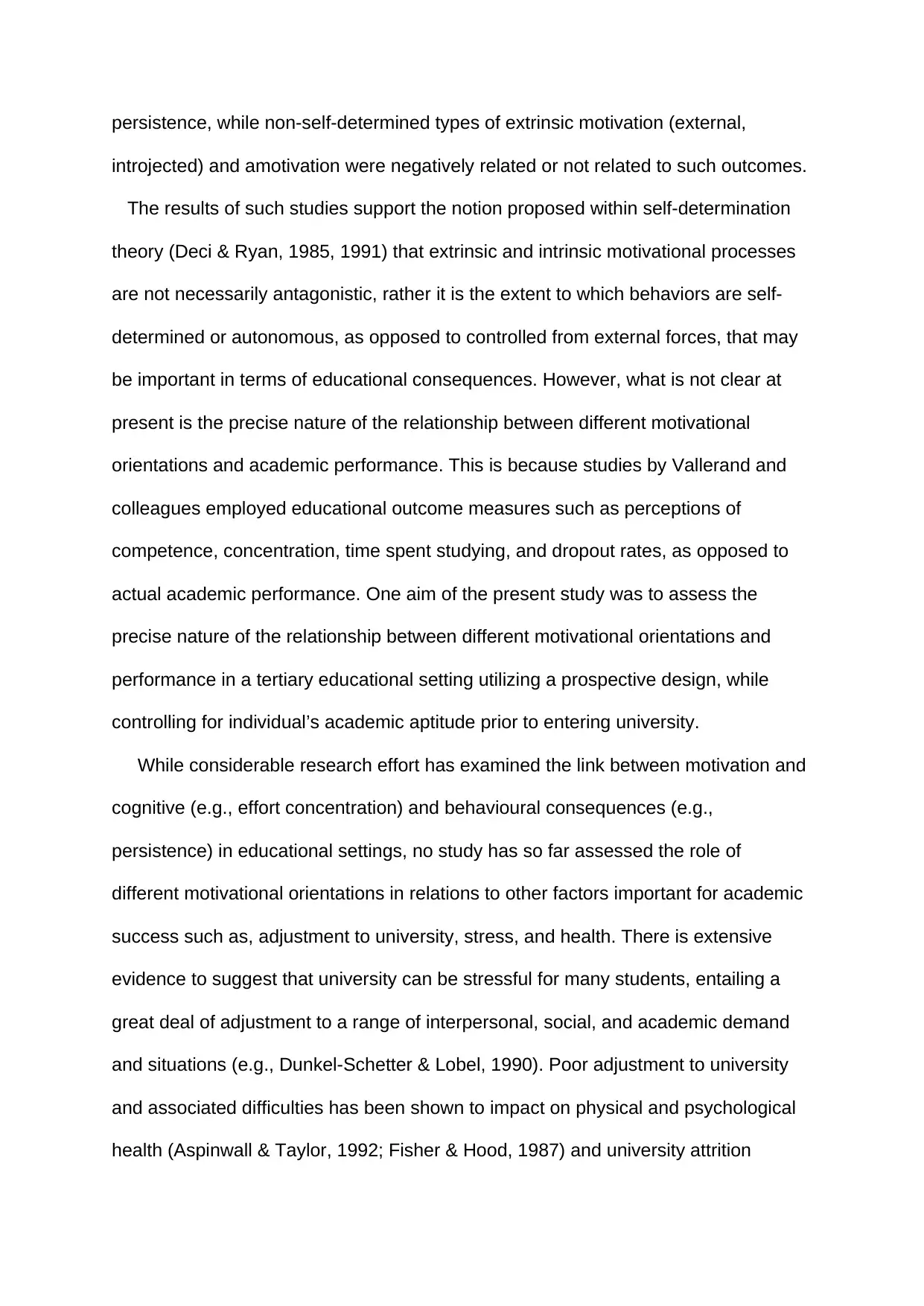
persistence, while non-self-determined types of extrinsic motivation (external,
introjected) and amotivation were negatively related or not related to such outcomes.
The results of such studies support the notion proposed within self-determination
theory (Deci & Ryan, 1985, 1991) that extrinsic and intrinsic motivational processes
are not necessarily antagonistic, rather it is the extent to which behaviors are self-
determined or autonomous, as opposed to controlled from external forces, that may
be important in terms of educational consequences. However, what is not clear at
present is the precise nature of the relationship between different motivational
orientations and academic performance. This is because studies by Vallerand and
colleagues employed educational outcome measures such as perceptions of
competence, concentration, time spent studying, and dropout rates, as opposed to
actual academic performance. One aim of the present study was to assess the
precise nature of the relationship between different motivational orientations and
performance in a tertiary educational setting utilizing a prospective design, while
controlling for individual’s academic aptitude prior to entering university.
While considerable research effort has examined the link between motivation and
cognitive (e.g., effort concentration) and behavioural consequences (e.g.,
persistence) in educational settings, no study has so far assessed the role of
different motivational orientations in relations to other factors important for academic
success such as, adjustment to university, stress, and health. There is extensive
evidence to suggest that university can be stressful for many students, entailing a
great deal of adjustment to a range of interpersonal, social, and academic demand
and situations (e.g., Dunkel-Schetter & Lobel, 1990). Poor adjustment to university
and associated difficulties has been shown to impact on physical and psychological
health (Aspinwall & Taylor, 1992; Fisher & Hood, 1987) and university attrition
introjected) and amotivation were negatively related or not related to such outcomes.
The results of such studies support the notion proposed within self-determination
theory (Deci & Ryan, 1985, 1991) that extrinsic and intrinsic motivational processes
are not necessarily antagonistic, rather it is the extent to which behaviors are self-
determined or autonomous, as opposed to controlled from external forces, that may
be important in terms of educational consequences. However, what is not clear at
present is the precise nature of the relationship between different motivational
orientations and academic performance. This is because studies by Vallerand and
colleagues employed educational outcome measures such as perceptions of
competence, concentration, time spent studying, and dropout rates, as opposed to
actual academic performance. One aim of the present study was to assess the
precise nature of the relationship between different motivational orientations and
performance in a tertiary educational setting utilizing a prospective design, while
controlling for individual’s academic aptitude prior to entering university.
While considerable research effort has examined the link between motivation and
cognitive (e.g., effort concentration) and behavioural consequences (e.g.,
persistence) in educational settings, no study has so far assessed the role of
different motivational orientations in relations to other factors important for academic
success such as, adjustment to university, stress, and health. There is extensive
evidence to suggest that university can be stressful for many students, entailing a
great deal of adjustment to a range of interpersonal, social, and academic demand
and situations (e.g., Dunkel-Schetter & Lobel, 1990). Poor adjustment to university
and associated difficulties has been shown to impact on physical and psychological
health (Aspinwall & Taylor, 1992; Fisher & Hood, 1987) and university attrition
⊘ This is a preview!⊘
Do you want full access?
Subscribe today to unlock all pages.

Trusted by 1+ million students worldwide
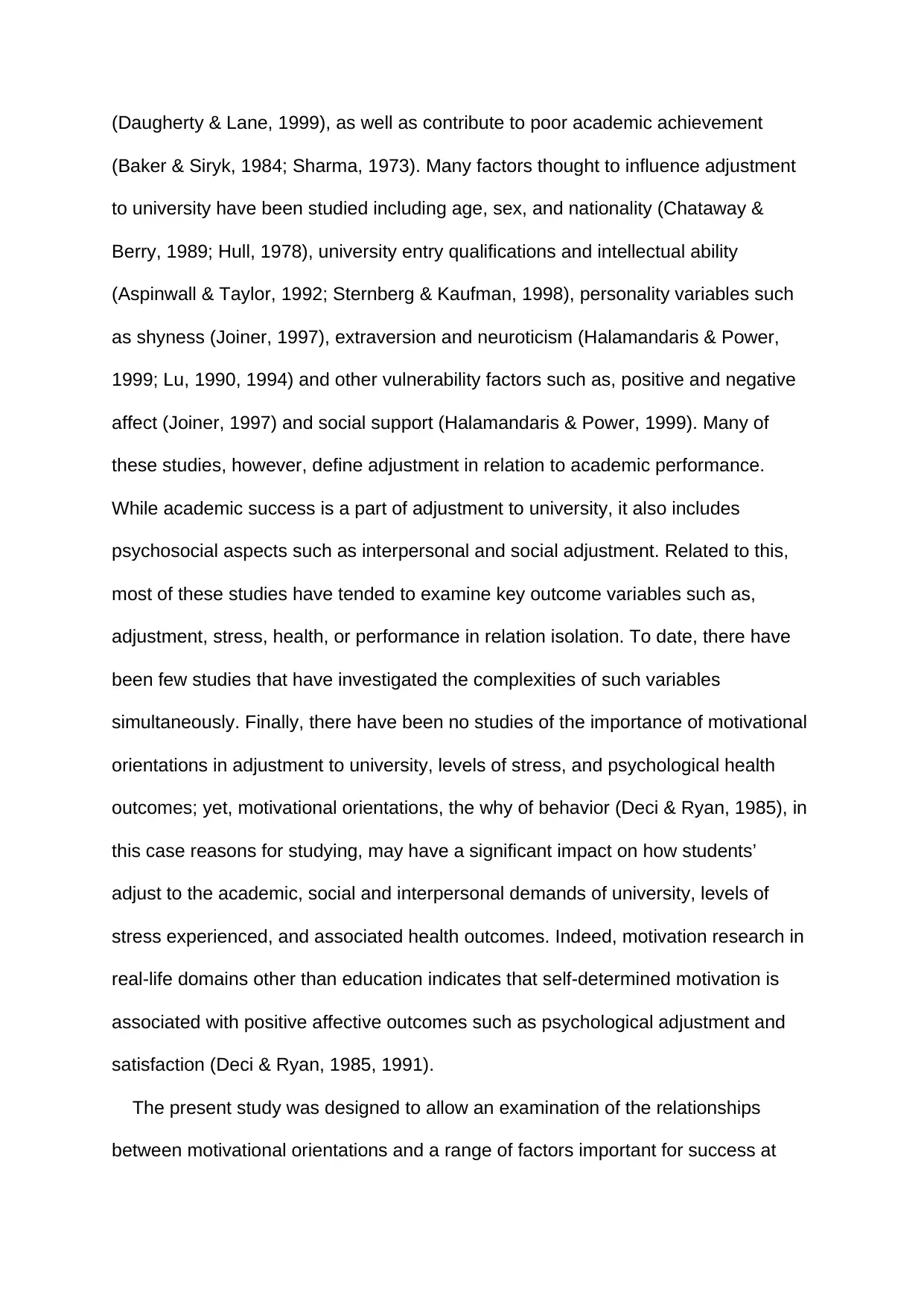
(Daugherty & Lane, 1999), as well as contribute to poor academic achievement
(Baker & Siryk, 1984; Sharma, 1973). Many factors thought to influence adjustment
to university have been studied including age, sex, and nationality (Chataway &
Berry, 1989; Hull, 1978), university entry qualifications and intellectual ability
(Aspinwall & Taylor, 1992; Sternberg & Kaufman, 1998), personality variables such
as shyness (Joiner, 1997), extraversion and neuroticism (Halamandaris & Power,
1999; Lu, 1990, 1994) and other vulnerability factors such as, positive and negative
affect (Joiner, 1997) and social support (Halamandaris & Power, 1999). Many of
these studies, however, define adjustment in relation to academic performance.
While academic success is a part of adjustment to university, it also includes
psychosocial aspects such as interpersonal and social adjustment. Related to this,
most of these studies have tended to examine key outcome variables such as,
adjustment, stress, health, or performance in relation isolation. To date, there have
been few studies that have investigated the complexities of such variables
simultaneously. Finally, there have been no studies of the importance of motivational
orientations in adjustment to university, levels of stress, and psychological health
outcomes; yet, motivational orientations, the why of behavior (Deci & Ryan, 1985), in
this case reasons for studying, may have a significant impact on how students’
adjust to the academic, social and interpersonal demands of university, levels of
stress experienced, and associated health outcomes. Indeed, motivation research in
real-life domains other than education indicates that self-determined motivation is
associated with positive affective outcomes such as psychological adjustment and
satisfaction (Deci & Ryan, 1985, 1991).
The present study was designed to allow an examination of the relationships
between motivational orientations and a range of factors important for success at
(Baker & Siryk, 1984; Sharma, 1973). Many factors thought to influence adjustment
to university have been studied including age, sex, and nationality (Chataway &
Berry, 1989; Hull, 1978), university entry qualifications and intellectual ability
(Aspinwall & Taylor, 1992; Sternberg & Kaufman, 1998), personality variables such
as shyness (Joiner, 1997), extraversion and neuroticism (Halamandaris & Power,
1999; Lu, 1990, 1994) and other vulnerability factors such as, positive and negative
affect (Joiner, 1997) and social support (Halamandaris & Power, 1999). Many of
these studies, however, define adjustment in relation to academic performance.
While academic success is a part of adjustment to university, it also includes
psychosocial aspects such as interpersonal and social adjustment. Related to this,
most of these studies have tended to examine key outcome variables such as,
adjustment, stress, health, or performance in relation isolation. To date, there have
been few studies that have investigated the complexities of such variables
simultaneously. Finally, there have been no studies of the importance of motivational
orientations in adjustment to university, levels of stress, and psychological health
outcomes; yet, motivational orientations, the why of behavior (Deci & Ryan, 1985), in
this case reasons for studying, may have a significant impact on how students’
adjust to the academic, social and interpersonal demands of university, levels of
stress experienced, and associated health outcomes. Indeed, motivation research in
real-life domains other than education indicates that self-determined motivation is
associated with positive affective outcomes such as psychological adjustment and
satisfaction (Deci & Ryan, 1985, 1991).
The present study was designed to allow an examination of the relationships
between motivational orientations and a range of factors important for success at
Paraphrase This Document
Need a fresh take? Get an instant paraphrase of this document with our AI Paraphraser
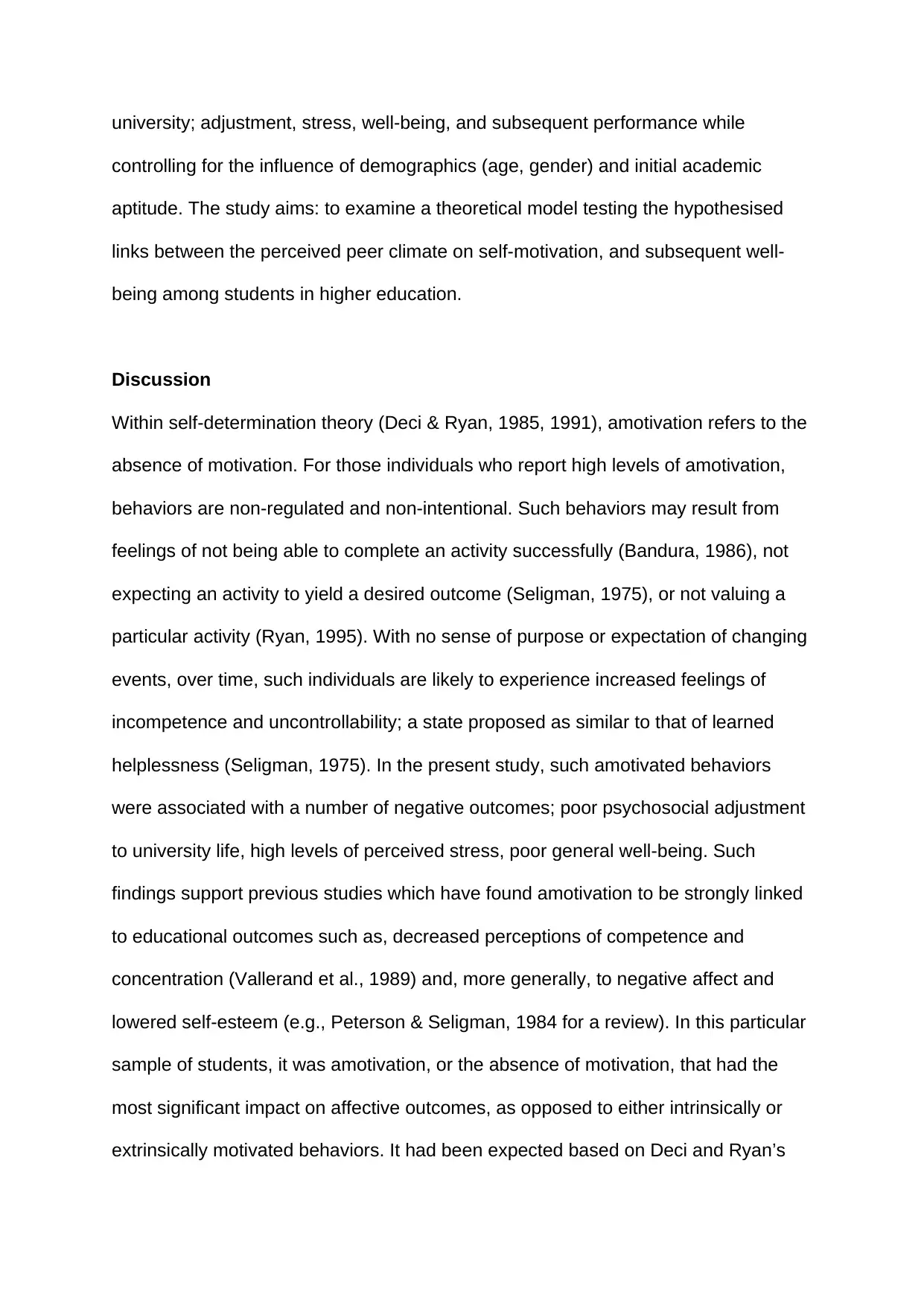
university; adjustment, stress, well-being, and subsequent performance while
controlling for the influence of demographics (age, gender) and initial academic
aptitude. The study aims: to examine a theoretical model testing the hypothesised
links between the perceived peer climate on self-motivation, and subsequent well-
being among students in higher education.
Discussion
Within self-determination theory (Deci & Ryan, 1985, 1991), amotivation refers to the
absence of motivation. For those individuals who report high levels of amotivation,
behaviors are non-regulated and non-intentional. Such behaviors may result from
feelings of not being able to complete an activity successfully (Bandura, 1986), not
expecting an activity to yield a desired outcome (Seligman, 1975), or not valuing a
particular activity (Ryan, 1995). With no sense of purpose or expectation of changing
events, over time, such individuals are likely to experience increased feelings of
incompetence and uncontrollability; a state proposed as similar to that of learned
helplessness (Seligman, 1975). In the present study, such amotivated behaviors
were associated with a number of negative outcomes; poor psychosocial adjustment
to university life, high levels of perceived stress, poor general well-being. Such
findings support previous studies which have found amotivation to be strongly linked
to educational outcomes such as, decreased perceptions of competence and
concentration (Vallerand et al., 1989) and, more generally, to negative affect and
lowered self-esteem (e.g., Peterson & Seligman, 1984 for a review). In this particular
sample of students, it was amotivation, or the absence of motivation, that had the
most significant impact on affective outcomes, as opposed to either intrinsically or
extrinsically motivated behaviors. It had been expected based on Deci and Ryan’s
controlling for the influence of demographics (age, gender) and initial academic
aptitude. The study aims: to examine a theoretical model testing the hypothesised
links between the perceived peer climate on self-motivation, and subsequent well-
being among students in higher education.
Discussion
Within self-determination theory (Deci & Ryan, 1985, 1991), amotivation refers to the
absence of motivation. For those individuals who report high levels of amotivation,
behaviors are non-regulated and non-intentional. Such behaviors may result from
feelings of not being able to complete an activity successfully (Bandura, 1986), not
expecting an activity to yield a desired outcome (Seligman, 1975), or not valuing a
particular activity (Ryan, 1995). With no sense of purpose or expectation of changing
events, over time, such individuals are likely to experience increased feelings of
incompetence and uncontrollability; a state proposed as similar to that of learned
helplessness (Seligman, 1975). In the present study, such amotivated behaviors
were associated with a number of negative outcomes; poor psychosocial adjustment
to university life, high levels of perceived stress, poor general well-being. Such
findings support previous studies which have found amotivation to be strongly linked
to educational outcomes such as, decreased perceptions of competence and
concentration (Vallerand et al., 1989) and, more generally, to negative affect and
lowered self-esteem (e.g., Peterson & Seligman, 1984 for a review). In this particular
sample of students, it was amotivation, or the absence of motivation, that had the
most significant impact on affective outcomes, as opposed to either intrinsically or
extrinsically motivated behaviors. It had been expected based on Deci and Ryan’s
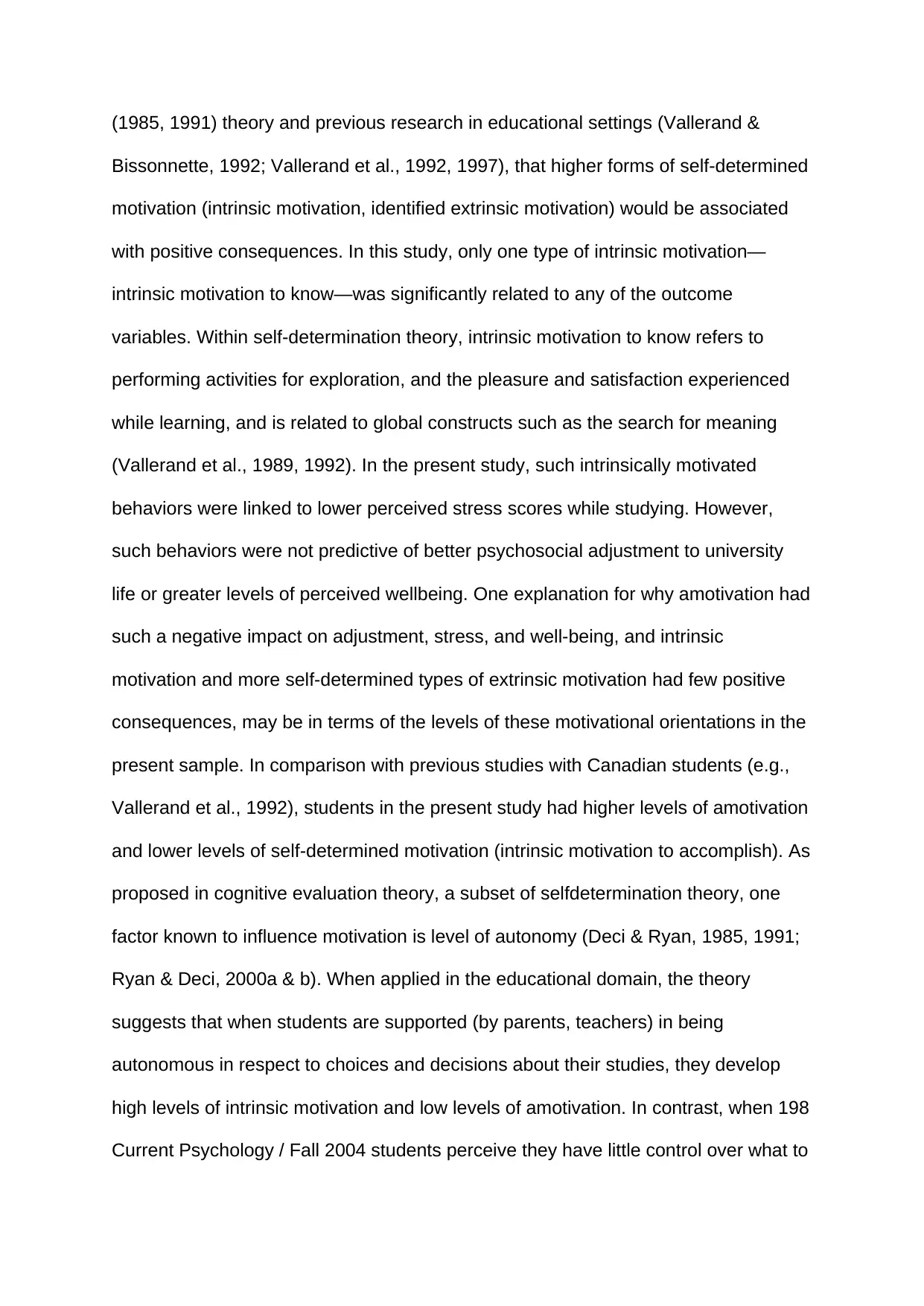
(1985, 1991) theory and previous research in educational settings (Vallerand &
Bissonnette, 1992; Vallerand et al., 1992, 1997), that higher forms of self-determined
motivation (intrinsic motivation, identified extrinsic motivation) would be associated
with positive consequences. In this study, only one type of intrinsic motivation—
intrinsic motivation to know—was significantly related to any of the outcome
variables. Within self-determination theory, intrinsic motivation to know refers to
performing activities for exploration, and the pleasure and satisfaction experienced
while learning, and is related to global constructs such as the search for meaning
(Vallerand et al., 1989, 1992). In the present study, such intrinsically motivated
behaviors were linked to lower perceived stress scores while studying. However,
such behaviors were not predictive of better psychosocial adjustment to university
life or greater levels of perceived wellbeing. One explanation for why amotivation had
such a negative impact on adjustment, stress, and well-being, and intrinsic
motivation and more self-determined types of extrinsic motivation had few positive
consequences, may be in terms of the levels of these motivational orientations in the
present sample. In comparison with previous studies with Canadian students (e.g.,
Vallerand et al., 1992), students in the present study had higher levels of amotivation
and lower levels of self-determined motivation (intrinsic motivation to accomplish). As
proposed in cognitive evaluation theory, a subset of selfdetermination theory, one
factor known to influence motivation is level of autonomy (Deci & Ryan, 1985, 1991;
Ryan & Deci, 2000a & b). When applied in the educational domain, the theory
suggests that when students are supported (by parents, teachers) in being
autonomous in respect to choices and decisions about their studies, they develop
high levels of intrinsic motivation and low levels of amotivation. In contrast, when 198
Current Psychology / Fall 2004 students perceive they have little control over what to
Bissonnette, 1992; Vallerand et al., 1992, 1997), that higher forms of self-determined
motivation (intrinsic motivation, identified extrinsic motivation) would be associated
with positive consequences. In this study, only one type of intrinsic motivation—
intrinsic motivation to know—was significantly related to any of the outcome
variables. Within self-determination theory, intrinsic motivation to know refers to
performing activities for exploration, and the pleasure and satisfaction experienced
while learning, and is related to global constructs such as the search for meaning
(Vallerand et al., 1989, 1992). In the present study, such intrinsically motivated
behaviors were linked to lower perceived stress scores while studying. However,
such behaviors were not predictive of better psychosocial adjustment to university
life or greater levels of perceived wellbeing. One explanation for why amotivation had
such a negative impact on adjustment, stress, and well-being, and intrinsic
motivation and more self-determined types of extrinsic motivation had few positive
consequences, may be in terms of the levels of these motivational orientations in the
present sample. In comparison with previous studies with Canadian students (e.g.,
Vallerand et al., 1992), students in the present study had higher levels of amotivation
and lower levels of self-determined motivation (intrinsic motivation to accomplish). As
proposed in cognitive evaluation theory, a subset of selfdetermination theory, one
factor known to influence motivation is level of autonomy (Deci & Ryan, 1985, 1991;
Ryan & Deci, 2000a & b). When applied in the educational domain, the theory
suggests that when students are supported (by parents, teachers) in being
autonomous in respect to choices and decisions about their studies, they develop
high levels of intrinsic motivation and low levels of amotivation. In contrast, when 198
Current Psychology / Fall 2004 students perceive they have little control over what to
⊘ This is a preview!⊘
Do you want full access?
Subscribe today to unlock all pages.

Trusted by 1+ million students worldwide
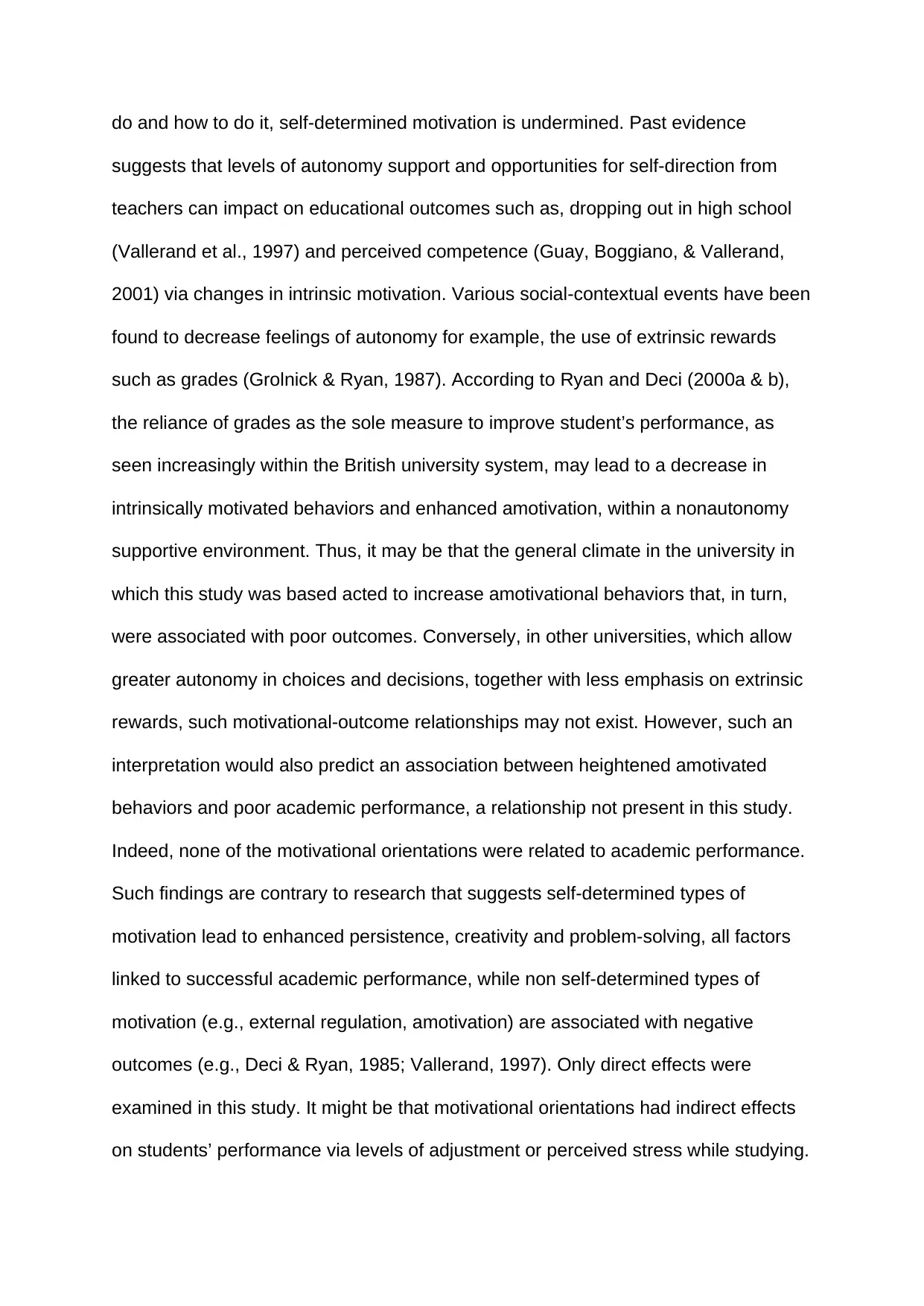
do and how to do it, self-determined motivation is undermined. Past evidence
suggests that levels of autonomy support and opportunities for self-direction from
teachers can impact on educational outcomes such as, dropping out in high school
(Vallerand et al., 1997) and perceived competence (Guay, Boggiano, & Vallerand,
2001) via changes in intrinsic motivation. Various social-contextual events have been
found to decrease feelings of autonomy for example, the use of extrinsic rewards
such as grades (Grolnick & Ryan, 1987). According to Ryan and Deci (2000a & b),
the reliance of grades as the sole measure to improve student’s performance, as
seen increasingly within the British university system, may lead to a decrease in
intrinsically motivated behaviors and enhanced amotivation, within a nonautonomy
supportive environment. Thus, it may be that the general climate in the university in
which this study was based acted to increase amotivational behaviors that, in turn,
were associated with poor outcomes. Conversely, in other universities, which allow
greater autonomy in choices and decisions, together with less emphasis on extrinsic
rewards, such motivational-outcome relationships may not exist. However, such an
interpretation would also predict an association between heightened amotivated
behaviors and poor academic performance, a relationship not present in this study.
Indeed, none of the motivational orientations were related to academic performance.
Such findings are contrary to research that suggests self-determined types of
motivation lead to enhanced persistence, creativity and problem-solving, all factors
linked to successful academic performance, while non self-determined types of
motivation (e.g., external regulation, amotivation) are associated with negative
outcomes (e.g., Deci & Ryan, 1985; Vallerand, 1997). Only direct effects were
examined in this study. It might be that motivational orientations had indirect effects
on students’ performance via levels of adjustment or perceived stress while studying.
suggests that levels of autonomy support and opportunities for self-direction from
teachers can impact on educational outcomes such as, dropping out in high school
(Vallerand et al., 1997) and perceived competence (Guay, Boggiano, & Vallerand,
2001) via changes in intrinsic motivation. Various social-contextual events have been
found to decrease feelings of autonomy for example, the use of extrinsic rewards
such as grades (Grolnick & Ryan, 1987). According to Ryan and Deci (2000a & b),
the reliance of grades as the sole measure to improve student’s performance, as
seen increasingly within the British university system, may lead to a decrease in
intrinsically motivated behaviors and enhanced amotivation, within a nonautonomy
supportive environment. Thus, it may be that the general climate in the university in
which this study was based acted to increase amotivational behaviors that, in turn,
were associated with poor outcomes. Conversely, in other universities, which allow
greater autonomy in choices and decisions, together with less emphasis on extrinsic
rewards, such motivational-outcome relationships may not exist. However, such an
interpretation would also predict an association between heightened amotivated
behaviors and poor academic performance, a relationship not present in this study.
Indeed, none of the motivational orientations were related to academic performance.
Such findings are contrary to research that suggests self-determined types of
motivation lead to enhanced persistence, creativity and problem-solving, all factors
linked to successful academic performance, while non self-determined types of
motivation (e.g., external regulation, amotivation) are associated with negative
outcomes (e.g., Deci & Ryan, 1985; Vallerand, 1997). Only direct effects were
examined in this study. It might be that motivational orientations had indirect effects
on students’ performance via levels of adjustment or perceived stress while studying.
Paraphrase This Document
Need a fresh take? Get an instant paraphrase of this document with our AI Paraphraser
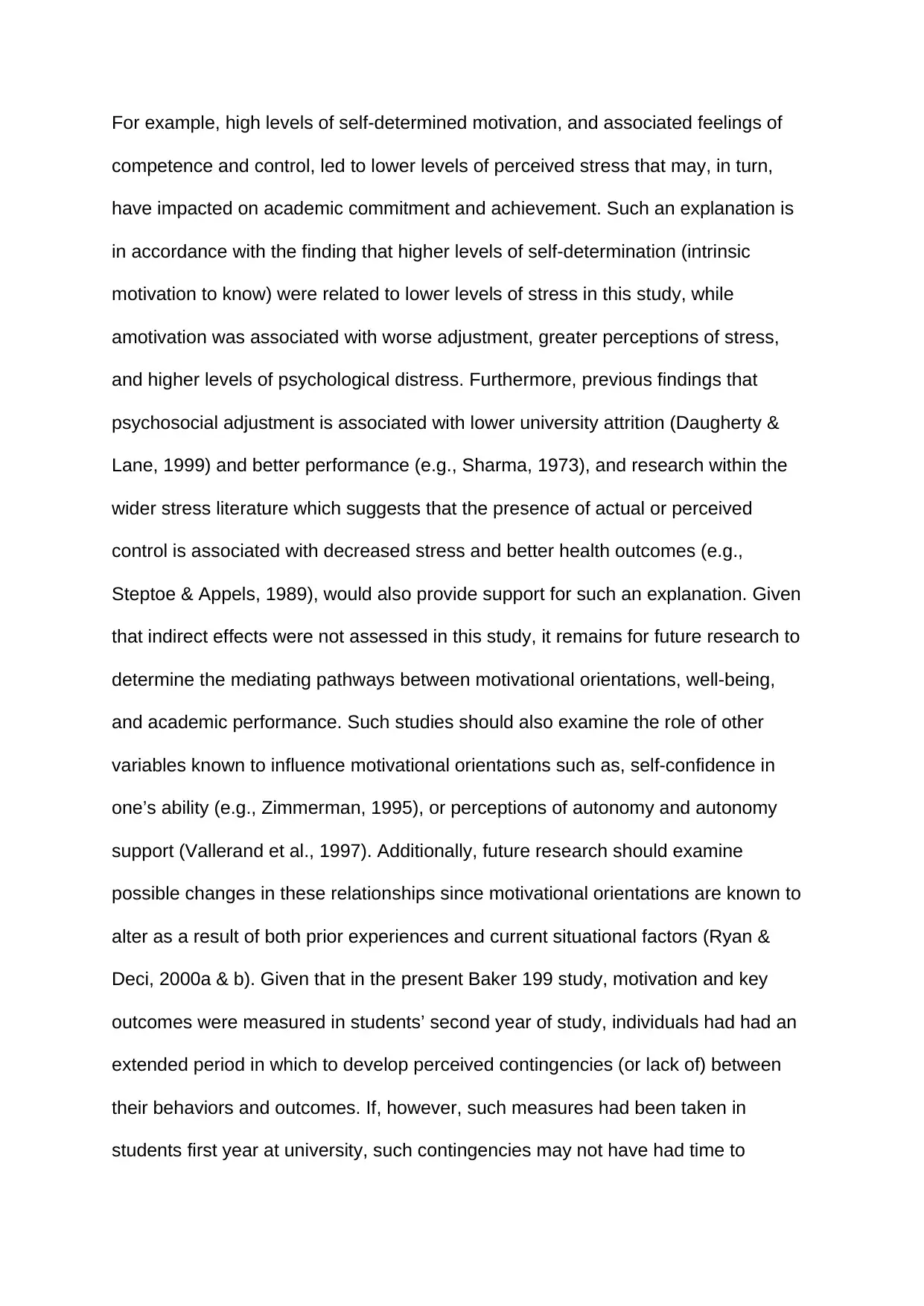
For example, high levels of self-determined motivation, and associated feelings of
competence and control, led to lower levels of perceived stress that may, in turn,
have impacted on academic commitment and achievement. Such an explanation is
in accordance with the finding that higher levels of self-determination (intrinsic
motivation to know) were related to lower levels of stress in this study, while
amotivation was associated with worse adjustment, greater perceptions of stress,
and higher levels of psychological distress. Furthermore, previous findings that
psychosocial adjustment is associated with lower university attrition (Daugherty &
Lane, 1999) and better performance (e.g., Sharma, 1973), and research within the
wider stress literature which suggests that the presence of actual or perceived
control is associated with decreased stress and better health outcomes (e.g.,
Steptoe & Appels, 1989), would also provide support for such an explanation. Given
that indirect effects were not assessed in this study, it remains for future research to
determine the mediating pathways between motivational orientations, well-being,
and academic performance. Such studies should also examine the role of other
variables known to influence motivational orientations such as, self-confidence in
one’s ability (e.g., Zimmerman, 1995), or perceptions of autonomy and autonomy
support (Vallerand et al., 1997). Additionally, future research should examine
possible changes in these relationships since motivational orientations are known to
alter as a result of both prior experiences and current situational factors (Ryan &
Deci, 2000a & b). Given that in the present Baker 199 study, motivation and key
outcomes were measured in students’ second year of study, individuals had had an
extended period in which to develop perceived contingencies (or lack of) between
their behaviors and outcomes. If, however, such measures had been taken in
students first year at university, such contingencies may not have had time to
competence and control, led to lower levels of perceived stress that may, in turn,
have impacted on academic commitment and achievement. Such an explanation is
in accordance with the finding that higher levels of self-determination (intrinsic
motivation to know) were related to lower levels of stress in this study, while
amotivation was associated with worse adjustment, greater perceptions of stress,
and higher levels of psychological distress. Furthermore, previous findings that
psychosocial adjustment is associated with lower university attrition (Daugherty &
Lane, 1999) and better performance (e.g., Sharma, 1973), and research within the
wider stress literature which suggests that the presence of actual or perceived
control is associated with decreased stress and better health outcomes (e.g.,
Steptoe & Appels, 1989), would also provide support for such an explanation. Given
that indirect effects were not assessed in this study, it remains for future research to
determine the mediating pathways between motivational orientations, well-being,
and academic performance. Such studies should also examine the role of other
variables known to influence motivational orientations such as, self-confidence in
one’s ability (e.g., Zimmerman, 1995), or perceptions of autonomy and autonomy
support (Vallerand et al., 1997). Additionally, future research should examine
possible changes in these relationships since motivational orientations are known to
alter as a result of both prior experiences and current situational factors (Ryan &
Deci, 2000a & b). Given that in the present Baker 199 study, motivation and key
outcomes were measured in students’ second year of study, individuals had had an
extended period in which to develop perceived contingencies (or lack of) between
their behaviors and outcomes. If, however, such measures had been taken in
students first year at university, such contingencies may not have had time to
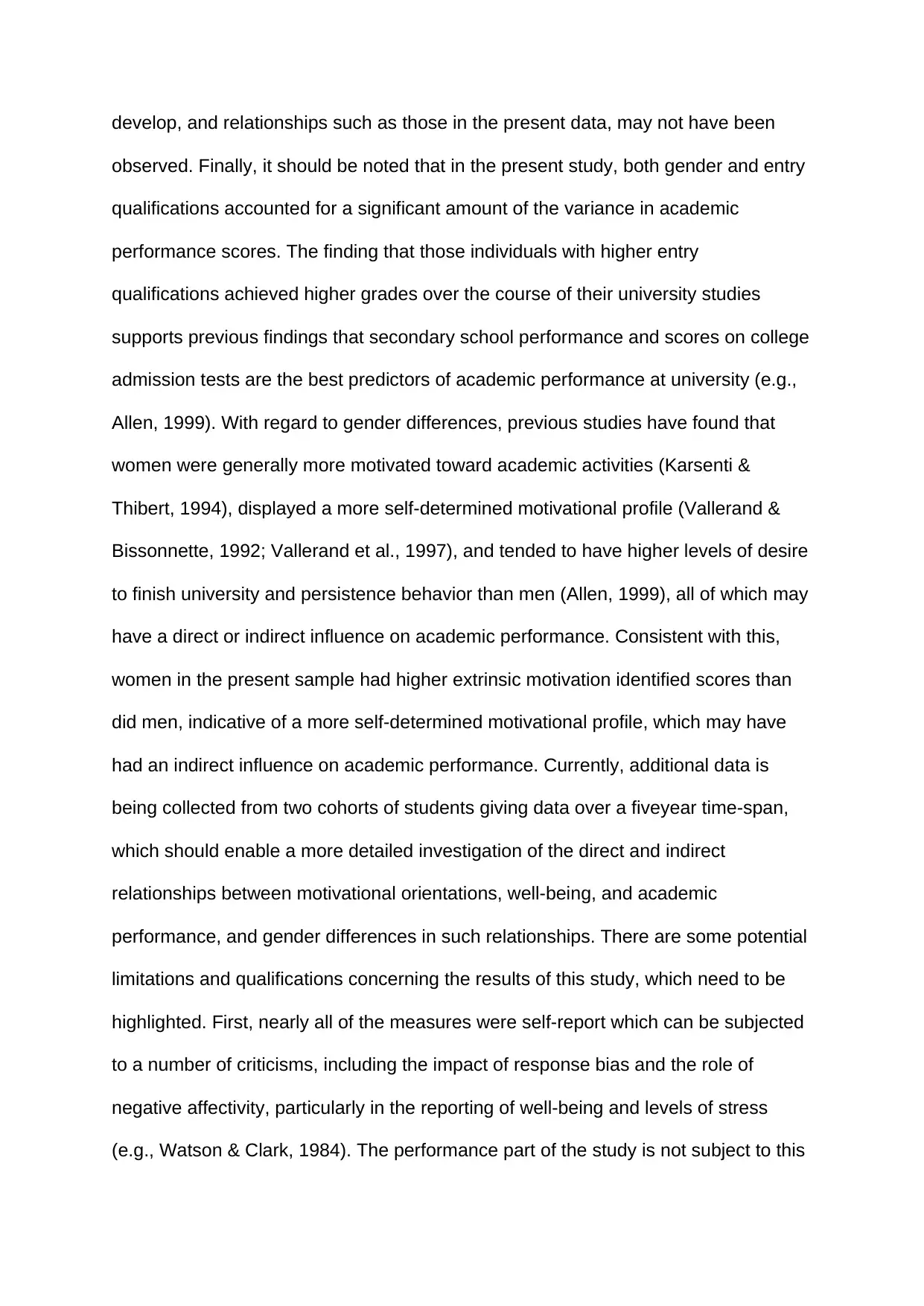
develop, and relationships such as those in the present data, may not have been
observed. Finally, it should be noted that in the present study, both gender and entry
qualifications accounted for a significant amount of the variance in academic
performance scores. The finding that those individuals with higher entry
qualifications achieved higher grades over the course of their university studies
supports previous findings that secondary school performance and scores on college
admission tests are the best predictors of academic performance at university (e.g.,
Allen, 1999). With regard to gender differences, previous studies have found that
women were generally more motivated toward academic activities (Karsenti &
Thibert, 1994), displayed a more self-determined motivational profile (Vallerand &
Bissonnette, 1992; Vallerand et al., 1997), and tended to have higher levels of desire
to finish university and persistence behavior than men (Allen, 1999), all of which may
have a direct or indirect influence on academic performance. Consistent with this,
women in the present sample had higher extrinsic motivation identified scores than
did men, indicative of a more self-determined motivational profile, which may have
had an indirect influence on academic performance. Currently, additional data is
being collected from two cohorts of students giving data over a fiveyear time-span,
which should enable a more detailed investigation of the direct and indirect
relationships between motivational orientations, well-being, and academic
performance, and gender differences in such relationships. There are some potential
limitations and qualifications concerning the results of this study, which need to be
highlighted. First, nearly all of the measures were self-report which can be subjected
to a number of criticisms, including the impact of response bias and the role of
negative affectivity, particularly in the reporting of well-being and levels of stress
(e.g., Watson & Clark, 1984). The performance part of the study is not subject to this
observed. Finally, it should be noted that in the present study, both gender and entry
qualifications accounted for a significant amount of the variance in academic
performance scores. The finding that those individuals with higher entry
qualifications achieved higher grades over the course of their university studies
supports previous findings that secondary school performance and scores on college
admission tests are the best predictors of academic performance at university (e.g.,
Allen, 1999). With regard to gender differences, previous studies have found that
women were generally more motivated toward academic activities (Karsenti &
Thibert, 1994), displayed a more self-determined motivational profile (Vallerand &
Bissonnette, 1992; Vallerand et al., 1997), and tended to have higher levels of desire
to finish university and persistence behavior than men (Allen, 1999), all of which may
have a direct or indirect influence on academic performance. Consistent with this,
women in the present sample had higher extrinsic motivation identified scores than
did men, indicative of a more self-determined motivational profile, which may have
had an indirect influence on academic performance. Currently, additional data is
being collected from two cohorts of students giving data over a fiveyear time-span,
which should enable a more detailed investigation of the direct and indirect
relationships between motivational orientations, well-being, and academic
performance, and gender differences in such relationships. There are some potential
limitations and qualifications concerning the results of this study, which need to be
highlighted. First, nearly all of the measures were self-report which can be subjected
to a number of criticisms, including the impact of response bias and the role of
negative affectivity, particularly in the reporting of well-being and levels of stress
(e.g., Watson & Clark, 1984). The performance part of the study is not subject to this
⊘ This is a preview!⊘
Do you want full access?
Subscribe today to unlock all pages.

Trusted by 1+ million students worldwide
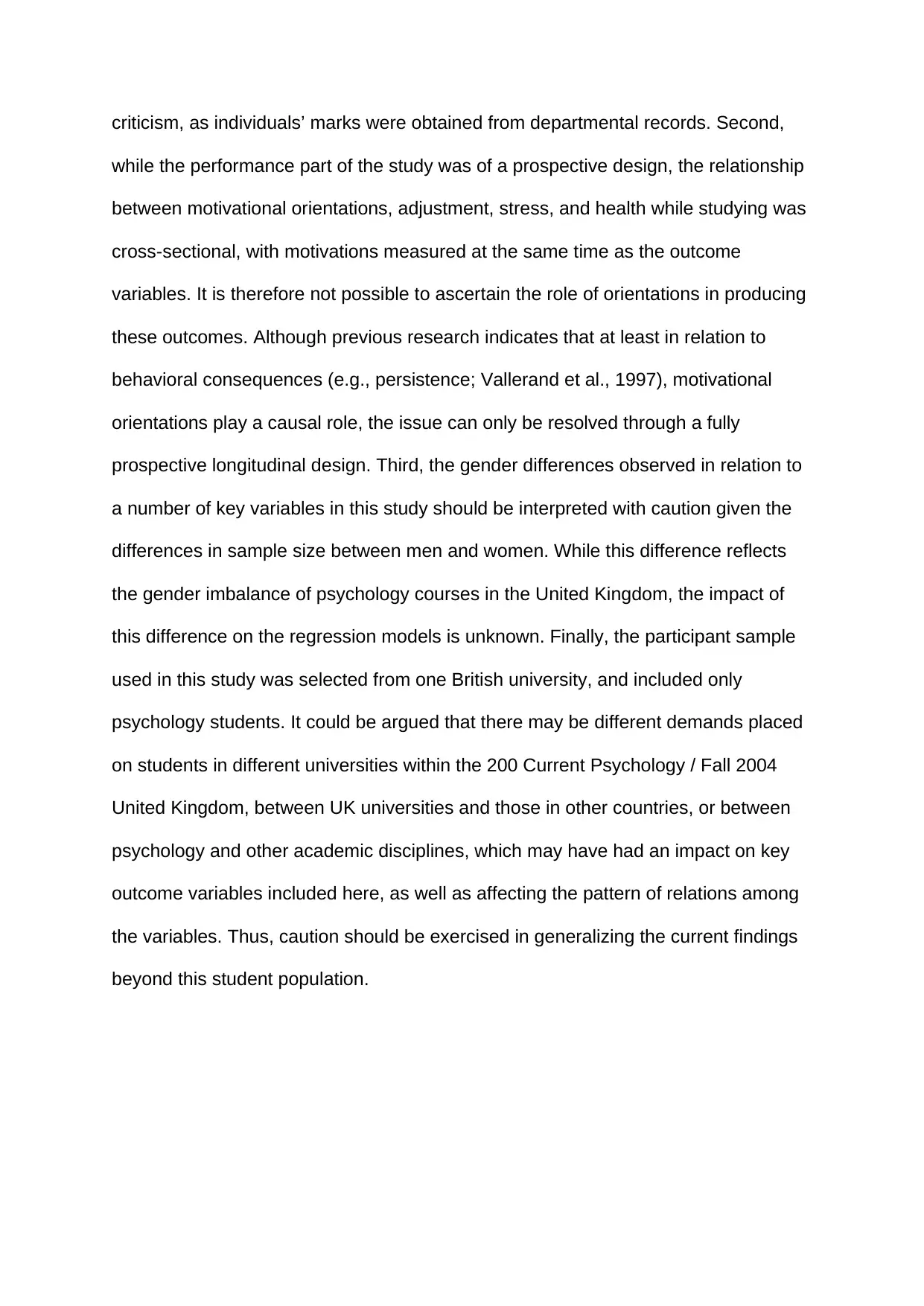
criticism, as individuals’ marks were obtained from departmental records. Second,
while the performance part of the study was of a prospective design, the relationship
between motivational orientations, adjustment, stress, and health while studying was
cross-sectional, with motivations measured at the same time as the outcome
variables. It is therefore not possible to ascertain the role of orientations in producing
these outcomes. Although previous research indicates that at least in relation to
behavioral consequences (e.g., persistence; Vallerand et al., 1997), motivational
orientations play a causal role, the issue can only be resolved through a fully
prospective longitudinal design. Third, the gender differences observed in relation to
a number of key variables in this study should be interpreted with caution given the
differences in sample size between men and women. While this difference reflects
the gender imbalance of psychology courses in the United Kingdom, the impact of
this difference on the regression models is unknown. Finally, the participant sample
used in this study was selected from one British university, and included only
psychology students. It could be argued that there may be different demands placed
on students in different universities within the 200 Current Psychology / Fall 2004
United Kingdom, between UK universities and those in other countries, or between
psychology and other academic disciplines, which may have had an impact on key
outcome variables included here, as well as affecting the pattern of relations among
the variables. Thus, caution should be exercised in generalizing the current findings
beyond this student population.
while the performance part of the study was of a prospective design, the relationship
between motivational orientations, adjustment, stress, and health while studying was
cross-sectional, with motivations measured at the same time as the outcome
variables. It is therefore not possible to ascertain the role of orientations in producing
these outcomes. Although previous research indicates that at least in relation to
behavioral consequences (e.g., persistence; Vallerand et al., 1997), motivational
orientations play a causal role, the issue can only be resolved through a fully
prospective longitudinal design. Third, the gender differences observed in relation to
a number of key variables in this study should be interpreted with caution given the
differences in sample size between men and women. While this difference reflects
the gender imbalance of psychology courses in the United Kingdom, the impact of
this difference on the regression models is unknown. Finally, the participant sample
used in this study was selected from one British university, and included only
psychology students. It could be argued that there may be different demands placed
on students in different universities within the 200 Current Psychology / Fall 2004
United Kingdom, between UK universities and those in other countries, or between
psychology and other academic disciplines, which may have had an impact on key
outcome variables included here, as well as affecting the pattern of relations among
the variables. Thus, caution should be exercised in generalizing the current findings
beyond this student population.
Paraphrase This Document
Need a fresh take? Get an instant paraphrase of this document with our AI Paraphraser

1 out of 11
Related Documents
Your All-in-One AI-Powered Toolkit for Academic Success.
+13062052269
info@desklib.com
Available 24*7 on WhatsApp / Email
![[object Object]](/_next/static/media/star-bottom.7253800d.svg)
Unlock your academic potential
Copyright © 2020–2026 A2Z Services. All Rights Reserved. Developed and managed by ZUCOL.





